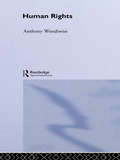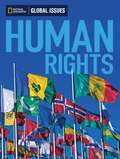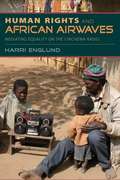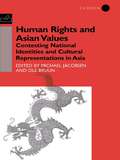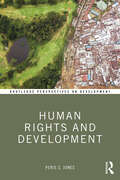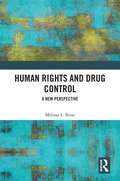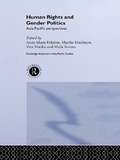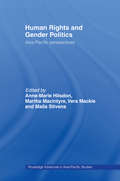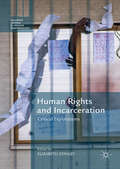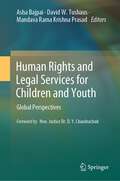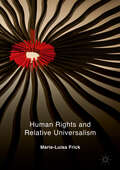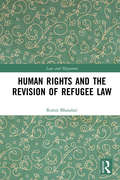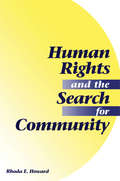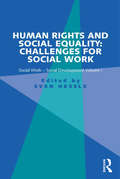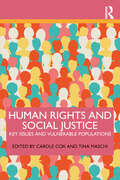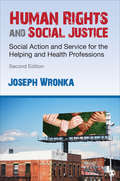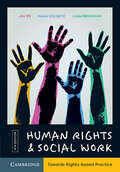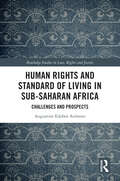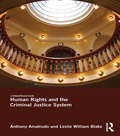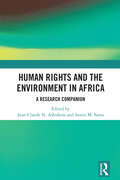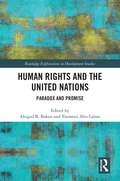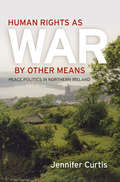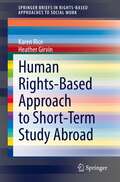- Table View
- List View
Human Rights (Key Ideas)
by Anthony WoodiwissAre human rights part of the problem or part of the solution in the current 'clash of civilizations'? Drawing on a hitherto neglected body of work in classical social theory and combining it with ideas derived from Barrington Moore, Norbert Elias and Michel Foucault, Woodiwiss poses and answers the questions: How did human rights become entangled with power relations? How might the nature of this entanglement be altered so that human rights better serve the global majority? In answering these questions, he explains how and why rights discourse developed in such distinctive ways in four key locations: Britain, the United States, Japan and in the UN. On this basis he provides, for the first time, a general sociological account of the development of international human rights discourse, which represents a striking challenge to current thinking and policy.
Human Rights and African Airwaves: Mediating Equality on the Chichewa Radio
by Harri EnglundHuman Rights and African Airwaves focuses on Nkhani Zam'maboma, a popular Chichewa news bulletin broadcast on Malawi's public radio. The program often takes authorities to task and questions much of the human rights rhetoric that comes from international organizations. Highlighting obligation and mutual dependence, the program expresses, in popular idioms and local narrative forms, grievances and injustices that are closest to Malawi's impoverished public. Harri Englund reveals broadcasters' everyday struggles with state-sponsored biases and a listening public with strong views and a critical ear. This fresh look at African-language media shows how Africans effectively confront inequality, exploitation, and poverty.
Human Rights and Asian Values: Contesting National Identities and Cultural Representations in Asia
by Ole Bruun Michael JacobsenThe Asian challenge to the universality of human rights has sparked off intense debate. This volume takes a clear stand for universal rights, both theoretically and empirically, by analysing social and political processes in a number of East and Southeast Asian countries. On the national arenas, Asian values are linked to the struggle between authoritarian and democratic forces, which both tend to convey stereotyped images of the 'west', but with reversed meanings.
Human Rights and Civil Liberties
by Howard DavisThis book provides a wide-ranging and accessible textbook covering the main areas of civil liberties and human rights law as it applies to England and Wales, meeting the requirements of undergraduate law syllabuses. The book sets out not only the legal rules, common law and statutes which relate to the field of civil liberties and human rights, but also the arguments and debates which have surrounded the development of an increasingly controversial area of the law, looking at the background principles underlying it, the coherence and consistency of the rules one to another and the social and political consequences of their application in practice. Particular attention is paid to the impact of developments in Europe, and especially to the Human Rights Act 1998 which has had an especial impact on the freedom to participate in determining public goals and the ability to preserve an area of personal autonomy. The book also addresses the nature and impact of the major statutory reforms in areas such as surveillance, protection of personal data and freedom of information, and devotes as well a chapter to the increasingly prominent issue of 'terrorism' and how the government and the law should respond.
Human Rights and Development (Routledge Perspectives on Development)
by Peris S JonesThe emergence of human rights within development and the evolving relationship was increasingly brought to bear upon key debates and policies over the last couple of decades. This book provides a critically informed, comprehensive and multi-disciplinary entry-level account of this engagement between human rights and development. It is theoretically and practically grounded and explores three over-arching questions and themes: First, why and how have human rights made this breakthrough? Second, is there agreement on human rights as a concept and how it is being used and understood within diverse development practices at global, national and local levels? Third, how can we gauge the impact of human rights based approaches upon development outcomes? The book concludes with what the future may hold for human rights and development. In-depth understanding of human rights as a development challenge and development as a human rights one, is presented and delineates the diverse responses and alternative critical approaches. Wide ranging in scope, it covers many examples of human rights within development, including global policy initiatives, and vulnerable groups, such as those living in poverty, socially excluded, people living with HIV/AIDS, residents of informal settlements, and human rights defenders. This textbook will be an essential resource for social science students, particularly in the fields of development studies, human rights and geography, as well as those interested in the intersection between law, human rights and social change. It should also appeal to practitioners in development and human rights.
Human Rights and Drug Control: A New Perspective
by Melissa L. BoneThis book uses a human rights perspective – developed philosophically, politically and legally – to change the way in which we think about drug control issues. The prohibitionist approach towards tackling the ‘drugs problem’ is not working. The laws and mentality that see drugs as the problem and tries to fight them, makes the ‘drugs problem’ worse. While the law is the best-placed mechanism to regulate our actions in relation to particular drugs, this book argues against the stranglehold of the criminal law, and instead presents a human rights perspective to change the way we think about drug control issues. Part I develops a conceptual framework for human rights in the context of drug control – philosophically, politically and legally – and applies this to the domestic (UK) and international drug control system. Part II focuses on case law to illustrate both the potential and the limitations of successfully applying this unique perspective in practice. The conclusion points towards a bottom-up process for drug policy which is capable of reconfiguring the mentality of prohibition. This book will be of interest to students and scholars of human rights, criminal law, criminology, politics and socio-legal studies.
Human Rights and Gender Politics: Asia-Pacific Perspectives (Routledge Advances in Asia-Pacific Studies #Vol. 5)
by Anne-Marie Hilsdon Martha Macintyre Vera Mackie Maila StivensIn recent years, the slogan "women's rights are human rights" has become a central claim of the of the global women's movement. Human Rights and Gender Politics: Asia-Pacific Perspectives examines the critical issues raised by this embracing and expansion of the human rights discourse by feminists worldwide.This volume challenges the conventional, ungendered and male-centred analysis of the politics of human rights and addresses the future of global feminisms. It is essential reading for all those interested in learning more about human rights and women's rights in the Asia-Pacific region.
Human Rights and Gender Politics: Asia-Pacific Perspectives (Routledge Advances In Asia-pacific Studies #Vol. 5)
by Vera Mackie Martha Macintyre Anne-Marie Hilsdon Maila StivensFirst Published in 2004. Routledge is an imprint of Taylor & Francis, an informa company.
Human Rights and Incarceration: Critical Explorations (Palgrave Studies in Prisons and Penology)
by Elizabeth StanleyThis collection considers human rights and incarceration in relation to the liberal-democratic states of Australia, New Zealand and the UK. It presents original case-study material on groups that are disproportionately affected by incarceration, including indigenous populations, children, women, those with disabilities, and refugees or ‘non-citizens’. The book considers how and why human rights are eroded, but also how they can be built and sustained through social, creative, cultural, legal, political and personal acts. It establishes the need for pragmatic reforms as well as the abolition of incarceration. Contributors consider what has, or might, work to secure rights for incarcerated populations, and they critically analyse human rights in their legal, socio-cultural, economic and political contexts. In covering this ground, the book presents a re-invigorated vision of human rights in relation to incarceration. After all, human rights are not static principles; they have to be developed, fought over and engaged with.
Human Rights and Legal Services for Children and Youth: Global Perspectives
by Asha Bajpai David W. Tushaus Mandava Rama Krishna PrasadThis book discusses legal services clinics and various other access-to-justice initiatives that are established to protect and represent the rights and interests of children and youth in several countries across the globe. These could include legal services or access-to-justice clinics run by government or universities or community. The book has contributions from academicians, lawyers, researchers and legal professionals from several counties including India, UK, USA, Brazil, Australia, Indonesia, Poland, and Spain, which discuss how they represent children and youth in their countries. The book looks at how these access-to-justice initiatives currently provide assistance, what are the child friendly justice procedures they use, and best practices that can be replicable in other jurisdictions. The chapters contain findings of field research studies, some case studies, and models related to these topics. There are recommendations on ways to strengthen access-to-justice and legal services for empowering children and youth. The main goal is to create a resource for readers who want to expand child advocacy opportunities in their own universities and communities. The reader may also learn how to conduct legislative advocacy and case law advocacy to improve laws in other jurisdictions; and take-away best and replicable initiatives. The practices could be adaptable by other clinics and countries. The book will be useful to child rights advocates and defenders, students of law, legal researchers, civil society organizations, legal services authorities, legal aid institutions, educational institutions, school authorities, juvenile justice authorities, clinical legal educators, justice educators, justice practitioners and law and policy makers.
Human Rights and Relative Universalism
by Marie-Luisa FrickThis book argues that human rights cannot go global without going local. This important lesson from the winding debates on universalism and particularism raises intricate questions: what are human rights after all, given the dissent surrounding their foundations, content, and scope? What are legitimate deviances from classical human rights (law) and where should we draw “red lines”? Making a case for balancing conceptual openness and distinctness, this book addresses the key human rights issues of our time and opens up novel spaces for deliberation. It engages philosophical reasoning with law, politics, and religion and demonstrates that a meaningful relativist account of human rights is not only possible, but a sorely needed antidote to dogmatism and polarization.
Human Rights and The Revision of Refugee Law (Law and Migration)
by Romit BhandariThis book addresses the relationship between International Refugee Law and International Human Rights Law. Using international refugee law’s analytical turn to human rights as its object of inquiry, it represents a critical intervention into the revisionism that has led to conceptual fragmentation and restrictive practices. Mainstream literature in refugee law reflects a mood of celebration, a narrative of progress which praises the discipline’s rescue from obsolescence. This is commonly ascribed to its repositioning alongside human rights law, its veritable rediscovery as an arm of this far greater edifice. By using human rights logic to construct the current legal paradigm and inform us of who qualifies as a refugee, this purportedly lent areas of conceptual uncertainty a set of objective, modern criteria and increased enfranchisement to new, non-traditional claimants. The present work challenges this dominant position by finding the untold limits of its current paradigm. It stands alone in this orientation and hereby represents one of the most comprehensive, heterodox and structurally detailed reviews of this connection. The exploration of the gap between modern approaches and the unsatisfactory realities of seeking asylum forms the substance of this book. It asserts, by contrast, the existence of revolution rather than evolution. Human rights law has erased the founding tenets of the Refugee Convention, enabling powerful states to contain refugees in their region of origin. The book will be essential reading for those interested in Refugee Law, Refugee Studies, Postcolonial Legal Studies, Postmodern Critiques and Critical Legal Theory. Additionally, given its relevance for the adjudication of refugee claims, it will be an important resource for solicitors, barristers and judges.
Human Rights And The Search For Community
by Rhoda E. Howard-hassmannSome critics contend that the concept of universal human rights reflects the West's anticommunitarian, self-centreed individualism, which disproportionately focuses on individual autonomy. In this book Rhoda Howard-Hassmann refutes this claim, arguing instead that communities can exist in modern Western societies if they protect the whole spectrum of individual human rights, not only civil and political but also economic rights.Howard-Hassmann supports the case for the universality of human rights by showing community to be inherent in and essential to the realization of universal human rights. She makes an original contribution to the study of universal human rights through her review of those types of communitarian thought that underlie cultural relativist attacks on human rights. Howard-Hassmann defends individual rights against conservative and leftist communitarian challenges emanating from both the Western world and the Third World. Exploring conservative viewpoints, she examines traditionalists of the Third World,focusing on African and Muslim traditionalist schools, as well as reactionary conservatives of the Western world. Howard-Hassmann then looks at challenges from the left, including collectivists, who see universal human rights as the products of cultural imperialism or capitalist exploitation, and status radicals, such as feminists or black activists, who are critics of liberalism.Howard-Hassmann also criticizes what she dubs radical capitalism" or social minimalism," the idea that there is a very narrow range of true human rights, including the right to property, and that citizens are responsible for no one but themselves. A community, in Howard-Hassmann's view, is a group of people who all feel a sense of obligation to all others in the group. For a community to work in the modern world, everyone must be treated equally, enjoy societal respect, and be able to act autonomously in her or his everyday decisionmaking.
Human Rights and Social Equality: Social Work-Social Development Volume I
by Sven HessleThe mission of the social work profession and the development of social policy are rooted in a set of core values and are the foundation of social work’s unique purpose and perspective. Human rights offer a normative base for social work and for the formation of inclusive social policies. This informative and incisively written edited collection brings together experts from around the world to explore the tension between a normative and a political base of social work and social development and, therefore, to address the question: How can social work and social policies contribute in the endeavor to respect, protect and fulfill human rights? This volume will show that there is no straightforward answer to this question owing to the clash between different sociocultural and local conditions and demands for universal human rights.
Human Rights and Social Justice: Key Issues and Vulnerable Populations
by Carole Cox Tina MaschiHuman Rights and Social Justice: Key Issues and Vulnerable Populations is a comprehensive text that focuses on central issues of human rights and justice and links them directly with social work competencies and practice. Drawing attention to oppression and multiple forms of disadvantage and discrimination based on a person’s identity and social location, this volume develops an integrated framework to advance human rights and social, economic, and environmental justice with vulnerable populations and communities across all three levels of practice. Each chapter, written by leading scholars in their respective fields, is designed to enhance students’ awareness, knowledge, and understanding of key theories and issues related to diversity, human rights, and equity. Broken into sections providing theory, practice, and case study illustrations, the chapters will first explain and argue that each person, regardless of their position in society, has basic human rights. Students will then see how these knowledges translate into practice through clear and engaging cases that reinforce skills and behaviors that social workers may use to advocate for human rights and ensure that they are distributed equitably and without prejudice. Providing a broad overview of social justice and rights-based challenges and connecting theory to the profession’s core competencies, this book is an excellent companion for social work students and faculty engaged in foundation and advanced courses in practice with individuals, groups, and communities and diversity and oppression.
Human Rights and Social Justice: Social Action and Service for the Helping and Health Professions
by Dr Joseph M. WronkaOffering a unique perspective that views human rights as the foundation of social justice, Joseph Wronka’s groundbreaking Human Rights and Social Justice outlines human rights and social justice concerns as a powerful conceptual framework for policy and practice interventions for the helping and health professions. This highly accessible, interdisciplinary text urges the creation of a human rights culture as a “lived awareness” of human rights principles, including human dignity, nondiscrimination, civil and political rights, economic, social, and cultural rights, and solidarity rights. The Second Edition includes numerous social action activities and questions for discussion to help scholars, activists, and practitioners promote a human rights culture and the overall well-being of populations across the globe.
Human Rights and Social Justice: Social Action and Service for the Helping and Health Professions
by Dr Joseph M. WronkaOffering a unique perspective that views human rights as the foundation of social justice, Joseph Wronka’s groundbreaking Human Rights and Social Justice outlines human rights and social justice concerns as a powerful conceptual framework for policy and practice interventions for the helping and health professions. This highly accessible, interdisciplinary text urges the creation of a human rights culture as a “lived awareness” of human rights principles, including human dignity, nondiscrimination, civil and political rights, economic, social, and cultural rights, and solidarity rights. The Second Edition includes numerous social action activities and questions for discussion to help scholars, activists, and practitioners promote a human rights culture and the overall well-being of populations across the globe.
Human Rights and Social Work: Towards Rights-Based Practice
by Jim Ife Linda Briskman Karen SoldatićHuman Rights and Social Work: Towards Rights-Based Practice helps students and practitioners understand how human rights concepts underpin the social work profession and inform their practice. This book examines the three generations of human rights and the systems of oppression that prevent citizens from participating in society as equals. It explores a range of topics, from ethics and ethical social work practice, to deductive and inductive approaches to human rights, and global and local human rights discourses. The language, processes, structures and theories of social work that are fundamental to the profession are also discussed. This edition features case studies exploring current events, movements and human rights crises, including the Black Lives Matter movement, the Northern Territory Emergency Response, and homelessness among LGBTIQA+ young people. This edition is accompanied by online resources for both students and instructors. Human Rights and Social Work is an indispensable guide for social work students and practitioners.
Human Rights and Standard of Living in Sub-Saharan Africa: Challenges and Prospects (Routledge Studies in Law, Rights and Justice)
by Augustine Edobor ArimoroThis book offers a comprehensive and nuanced examination of the right to an adequate standard of living in Sub-Saharan Africa (SSA), shedding light on the multifaceted challenges, opportunities, and imperatives for action. The right to an adequate standard of living is a fundamental human right, essential for the dignity and well-being of all individuals. Yet, in SSA, the realisation of this right remains a complex and elusive goal, with millions of people facing poverty, inequality, and limited access to basic services. Through a series of in-depth chapters, the book explores the various dimensions of the right to an adequate standard of living, from the pervasive impacts of poverty and inequality to the critical importance of access to healthcare, education, housing, and justice. Drawing on a rich array of case studies, data, and expert analysis, the work provides a compelling and evidence-based assessment of the current state of affairs in SSA, highlighting the urgent need for comprehensive and context-specific approaches to advancing this fundamental right. Providing a roadmap for promoting sustainable and inclusive development, reducing poverty and inequality, and ensuring access to basic services for all, the volume offers a set of actionable recommendations for policymakers, practitioners, and researchers working in the areas of Human Rights Law, Development Law and, in particular, those focused on the United Nations Sustainable Development Goals. At the same time, it identifies key areas for further research and investigation, underscoring the importance of ongoing knowledge generation and exchange in support of evidence-based policy and practice.
Human Rights and the Criminal Justice System
by Anthony Amatrudo Leslie William BlakeWe now live in a world which thinks through the legislative implications of criminal justice with one eye on human rights. Human Rights and the Criminal Justice System provides comprehensive coverage of human rights as it relates to the contemporary criminal justice system. As well as being a significant aspect of international governance and global justice, Amatrudo and Blake argue here that human rights have also eclipsed the rhetoric of religion in contemporary moral discussion. This book explores topics such as terrorism, race, and the rights of prisoners, as well as existing legal structures, court practices, and the developing literature in Criminology, Law and Political Science, in order to critically review the relationship between the developing body of human rights theory and practice, and the criminal justice system. This book will be of considerable interest to those with academic concerns in this area; as well as providing an accessible, yet sophisticated, resource for upper level undergraduate and postgraduate human rights courses.
Human Rights and the Environment in Africa: A Research Companion
by Jean-Claude N. Ashukem Semie M. SamaThe relationship between human rights and the environment, as evidenced by the recent UN Resolution on the human right to a healthy environment, is a topical, fascinating, uneasy, and increasingly urgent one. This timely collection explores the inextricable relationship between human rights and the environment as a critical lens for understanding and addressing key human rights and environmental issues confronting Africa. The work explores theoretical, philosophical, doctrinal, and empirical research to interrogate and provide clarity on how and whether the human rights-based approach to environmental protection and policy implications has been effective in enhancing environmental protection and sustainability in Africa. It brings together an elite group of African and international experts to investigate the increasing connectivity and problems with African human rights, environmental governance, and the quest for sustainability. The book is divided into thematic clusters, including: the right of vulnerable communities to sustainability; climate change, the right to development and natural resource governance; corporate environmental responsibility and sustainability; the philosophy of environmental ethics and theories of human rights approaches to environmental governance; procedural environmental rights; the role of the judiciary in environmental protection; and desertification. These themes provide a structure to investigate and clarify specific fundamental questions on Africa’s environmental governance paradigm. This innovative contribution provides an interdisciplinary approach to the philosophical interrelationship and use of human rights approaches to ensure and enhance environmental protection and sustainability. As such, the book will be of interest to African scholars, researchers and students in Human Rights Law, Environmental Studies, Political Science, Ecology and Conservation and Development Studies. It will also be a valuable resource for policymakers, governments, NGOs, practitioners, and all those interested in African environmental governance.
Human Rights and the United Nations: Paradox and Promise (Routledge Explorations in Development Studies)
by Abigail B. Bakan Yasmeen Abu-LabanThis book considers the complex and contradictory role of the United Nations when it comes to human rights around the world. It depicts the United Nations as a global arena in which state and non-state actors continuously contest issues around human rights. This ongoing contestation simultaneously produces both advances and setbacks when it comes to the rights of stateless populations, women, Indigenous peoples, and racialized people, as well as rights related to health and the environment.Since the 1948 Universal Declaration of Human Rights and throughout various subsequent expansions, conventions and declarations, the United Nations has been central to the development and advancement of human rights as a primary, stated goal of global governance. However, there are various inherent contradictory tensions and challenges embedded in the United Nations promise for human rights. This timely collection investigates the United Nations’ role as knowledge producer, its relation to non-state actors, and the United Nations’ role as a system for grouping sovereign states, where there is uneven buy-in within non-binding agreements and tensions between national sovereignty and human rights. At a time when the world faces existential challenges from climate change to pandemics which disproportionately impact the world’s most vulnerable populations, this book addresses future challenges and possibilities for the United Nations.Human Rights and the United Nations: Paradox and Promise will be an important read for researchers and students across the fields of human rights, political science, international relations, and global development, as well as for United Nations and governmental policy analysts and advisors.
Human Rights as War by Other Means: Peace Politics in Northern Ireland (Pennsylvania Studies in Human Rights)
by Jennifer CurtisFollowing the 1998 peace agreement in Northern Ireland, political violence has dramatically declined and the region has been promoted as a model for peacemaking. Human rights discourse has played an ongoing role in the process but not simply as the means to promote peace. The language can also become a weapon as it is appropriated and adapted by different interest groups to pursue social, economic, and political objectives. Indeed, as violence still periodically breaks out and some ethnocommunal and class-based divisions have deepened, it is clear that the progression from human rights violations to human rights protections is neither inevitable nor smooth.Human Rights as War by Other Means traces the use of rights discourse in Northern Ireland's politics from the local civil rights campaigns of the 1960s to present-day activism for truth recovery and LGBT equality. Combining firsthand ethnographic reportage with historical research, Jennifer Curtis analyzes how rights discourse came to permeate grassroots politics and activism, how it transformed those politics, and how rights discourse was in turn transformed. This ethnographic history foregrounds the stories of ordinary people in Northern Ireland who embraced different rights politics and laws to conduct, conclude, and, in some ways, continue the conflict—a complex portrait that challenges the dominant postconflict narrative of political and social abuses vanquished by a collective commitment to human rights. As Curtis demonstrates, failure to critique the appropriation of rights discourse in the peace process perpetuates perilous conditions for a fragile peace and generates flawed prescriptions for other conflicts.
Human Rights-Based Approach to Short-Term Study Abroad (SpringerBriefs in Rights-Based Approaches to Social Work)
by Karen Rice Heather GirvinShort-term study abroad experiences are on the rise across social work programs. This increase is fueled by the Educational Policy and Accreditation Standards of the Council on Social Work Education (CSWE) that social work programs graduate students who are ready to engage diversity and function ethically as global citizens who understand mechanisms of oppression. With the increasing number of short-term study abroad trips, this brief offers a framework that provides strategies for empowering the populations and communities in which these trips occur. Developing short-term study abroad trips from a human rights-based framework rather than a needs-based approach is urgent and necessary, as the community in which the visit will occur is placed at the center of planning efforts and its members become equal and active participants. The brief is accessible and relevant to both instructors and students, with thoughtful emphasis placed in each chapter to align with the needs of each group more distinctly. It is conceived with both travel-based (field education) and classroom learning (pre-trip preparation) in mind. Though developed with more depth, theory, and evidence than a "how-to manual," the brief serves as an exemplary "guide" that prepares those engaging in short-term study abroad trips with information and strategies that are derived from the key concepts of a rights-based approach to field education. Human Rights-Based Approach to Short-Term Study Abroad is essential reading that engages students and faculty with case examples to illuminate the complex concepts that are taught by faculty as well as specific exercises and assignments to guide both faculty and student through the process of developing and implementing short-term study abroad trips. This brief is of immediate relevance for undergraduate and graduate coursework in field education, international social work, human rights, global social work, and macro social work, as well as useful for any practitioner seeking CSWE accreditation.
